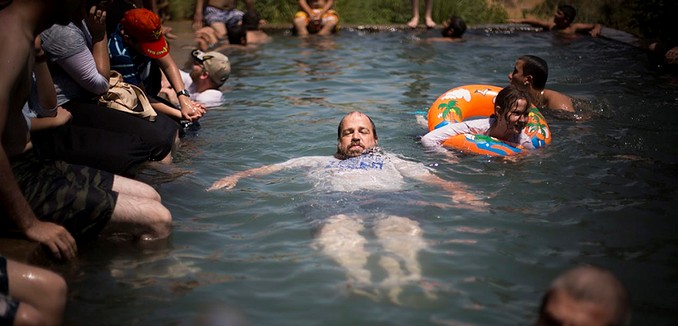In the wake of a debunked claim last week that Israel had cut off water supplies to Palestinians in the West Bank, the Palestinian Authority’s Foreign Ministry claimed that a rabbi authorized Jews to poison wells belonging to Palestinians, The Jerusalem Post reported Monday.
In a statement, the PA’s Foreign Ministry cited a report from Turkey’s state-run Andalou news agency, which alleged that a “Rabbi Mlmad” had issued a ruling allowing Jews to poison Palestinian wells. The statement decried the supposed ruling as a crime against humanity and called on Israel to arrest the rabbi. “What is the international community waiting for to interfere; the death of thousands of Palestinians of thirst?” the ministry asked.
The Post observed that “false accusations of poisoning wells have been used to inflame violence against Jews since as early as the Middle Ages.”
The Andalou report, which initially published the allegations against a “Rabbi Shlomo Mlma, chairman of the Council of Rabbis in the West Bank settlements,” was later picked up by the website Palestine Chronicle and the anti-Israel blog Middle East Monitor. Basem Naim, a former Hamas health minister and self-described head of Hamas’ Council on International Relations, tweeted the charge along with a photo of Israeli MK Yisrael Eichler.
V Dangerous ❗️#Israel Rabbi call 2 poison the water in the #WestBank 2 displace Palestinians from their land. #BDS pic.twitter.com/mG9pJID0Yh
— Dr. Basem Naim (@basemn63) June 19, 2016
The Jerusalem Post was unable to verify the existence of any Rabbi Shlomo Mlma or Mlmad, or of the Council of Rabbis in West Bank settlements. However, it noted that “there is a Council of Rabbis in Judea and Samaria, led by Yishai Babad,” as well as a rabbi named Zalman Melamed in Beit El, located in the West Bank. Rabbi Melamed denied ever issuing such a ruling, telling the media watchdog CAMERA that he does not “believe any rabbi would say something like that.” Melamed also denounced the charge as a blood libel.
Andalou attributed the allegations in its report to Breaking the Silence, a group with the stated goal of ending the occupation of Palestinian territories. A spokesman for Breaking the Silence told the Post that it had no testimony about poisoning Palestinian wells. Notably, the Hebrew-language website NRG last week posted a video of a leader of the group claiming less than two years ago that Israelis had poisoned a well to induce Palestinians to move from their land.
Claims that Israel had stopped supplying water to thousands of West Bank Palestinians during the holy month of Ramadan, published last week by Al Jazeera and The Independent, were refuted by Israel’s national water utility; Mekorot noted that while it reduced allocations of water to both Israeli and Palestinian communities due to increased demand in the summer and declining water levels in the West Bank’s mountain aquifer, it also increased allocations to Palestinians during Ramadan. And while a burst pipeline caused temporary disruptions in supply to several West Bank communities, the pipeline was subsequently repaired by Israel’s Coordinator of Government Activities in the Territories Unit. Neither COGAT nor Mekorot gave credence to the claim that the water supply to any West Bank community was cut off by Israel.
Peter Yeung, who wrote The Independent report, defended it by claiming that it was based on an allegation, rather than reported as fact.
@adirkrafman @Independent @cogat_israel the allegation still stands. It was never reported as fact
— Peter Yeung (@ptr_yeung) June 15, 2016
Prof. Chaim Gvirtzman, one of the top experts on water supplies in the West Bank, observed in 2014 that “There is no real Palestinian desire to solve water problems; they prefer to perpetuate the water problems in order to besmirch the State of Israel. They view water as a tool with which to bash Israel.”
Similarly, Akiva Bigman observed in the Myth of the Thirsty Palestinian, which was published in the April 2014 issue of The Tower Magazine:
To the extent that a viable water supply infrastructure exists in the West Bank, it is because Israel built and maintained it. While this infrastructure was certainly constructed, in part, to service Israeli communities, its benefits have not been denied to the Palestinians, and no one familiar with the statistics involved can claim otherwise without being patently dishonest.
That Israel is so consistently blamed for this problem is especially problematic because it makes it less likely that the Palestinians will deal with it themselves. As shown above, the Palestinians have the ability to both live up to their obligations under international law and solve their existing water problems in doing so. The money, technology, and knowledge they need all exist and are available to them from both foreign and Israeli sources. That the Palestinians have either chosen not to avail themselves of such aid or cannot do so effectively due to internal problems is tragic, but it is not the fault of the State of Israel.
[Photo: Yonatan Sindel / Flash90 ]




